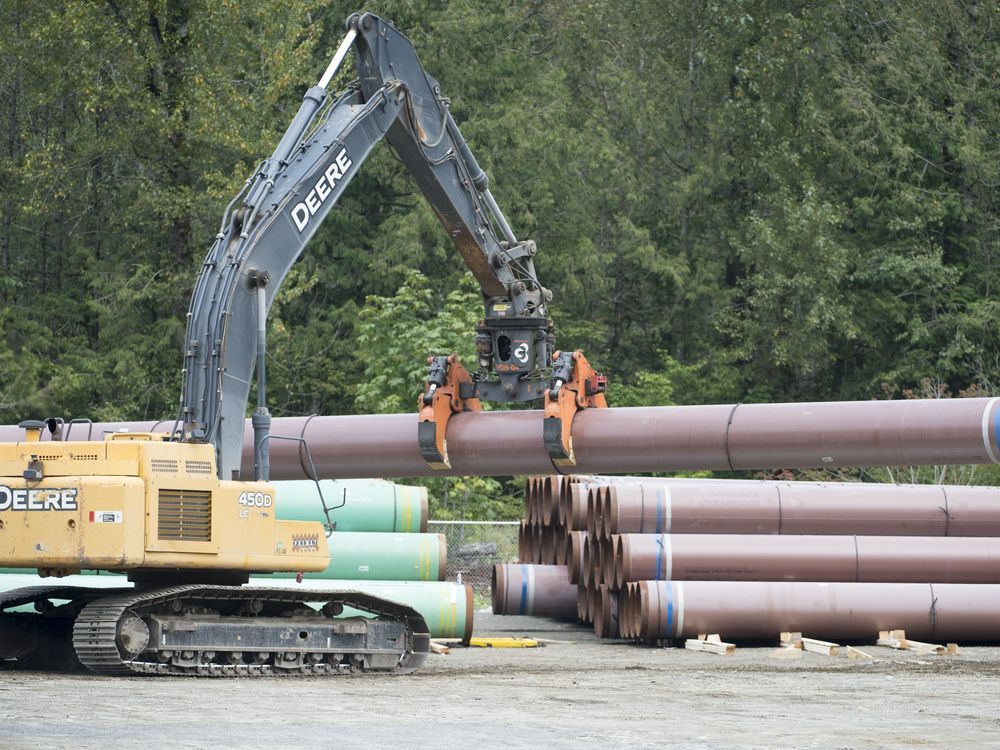Amid an oil glut and pipeline shortage to U.S. refiners, Canadian National Railway Co. hopes to be sending pellets of solidified oil sands bitumen to overseas markets within three years.
Montreal-based CN says its plan to package oil sands bitumen in soap-bar-sized pellets could help alleviate some of the transportation bottleneck in Alberta and move the oil to more lucrative markets in Asia.
CN said it has signed a memorandum of understanding with an Asian partner to build a full-scale production facility converting 50,000 barrels a day into pellets, which are formed by mixing and sealing bitumen balls with polymer, a plastic made from recycled grocery bags. The pellets are robust enough to be handled like pieces of coal, put through a conveyor system and dumped into the hold of a bulk carrier. They are designed to float, alleviating concerns of a tanker spill. The polymer is extracted and recycled at the destination through a shredding and heating process.
James Cairns, vice-president of petroleum and chemicals at CN, said the railway plans to have a smaller pilot project converting 10,000 barrels a day to pellets in 2019, either in Edmonton or at an oil sands production site near Fort McMurray, Alta.
Mr. Cairns said a CN delegation recently travelled to China and South Korea, where they found a lot of interest in the idea. He said CN is working with some Canadian producers who are interested in tapping overseas markets to avoid the deep discount they face in the United States.
CN declined to name the Canadian or Asian companies with which it is working.
“We have tested it out in the lab. We have proven the chemistry. We know it works. And the next stage is to go right to a pilot plan," Mr. Cairns said from Calgary. “After the pilot, it’s really up to the industry to see how well this gets adopted. We’re not a midstream company. We don’t own crude. We’re not going to buy or sell crude oil. We just facilitate the transportation. Our job is to put buyers and sellers together to see if this makes sense. Certainly it makes sense economically."
Benoit Poirier, an analyst at Desjardins Securities, said the pellets present a long-term, viable way for Canadian oil producers to reach overseas markets, as well as an attractive growth opportunity for CN.
Western Canada’s pipeline constraints have persisted – and worsened – since 2014 as production has risen even as pipelines have been cancelled or delayed. The resulting glut of Alberta oil has sent the price of Western Canadian Select plunging compared with U.S. oil. Alberta’s government has taken the remarkable steps of imposing production cuts and announcing plans to buy oil tank cars and locomotives to move oil to markets, calling on Ottawa to help fund its purchase.
“When you have one real customer – the U.S. – and you have multiple producers and an oversupply, that just leads to the terrible differential that we have,” Mr. Cairns said.
Amber Froese, a spokeswoman for Cenovus Energy, said in an e-mail that the Calgary-based oil producer is “looking at various opportunities in the area of solid bitumen on rail, but it’s very, very early days."
Edward Kallio of Eau Claire Energy Advisory said the innovation could reduce the demands on pipelines without posing a spill hazard, but needs a business case to be successful. “It’s a great idea to follow up and research," Mr. Kallio said by phone. "It’ll all come down to cost. Cost on one side and risk on the other. The environmental risk is very low so what’s the cost going to be?”
One bitumen barrel makes 600 pellets. An open-top rail car can carry about 615 barrels worth of heavy crude as pellets, once the polymer is extracted. This compares with the 390 barrels of heavy crude in a tank car, not including the dilutive chemicals.
CN says that based on current oil prices, the move to Asia is a money maker. That’s because the discount on Canadian oil at U.S. markets does not apply there. CN pointed to a study released earlier in 2018 that said it would cost about US$23 to ship a barrel of bitumen as CanaPux to Asia from Alberta, including packaging, rail and vessel charges. This is just less than the US$24 it costs to transport a barrel of diluted bitumen by train to the U.S. Gulf Coast.
One possible hurdle to CN’s plan to ship the pellets to Asia via the West Coast is the tanker ban on shipping oil, upgraded bitumen and other petroleum products from the tip of Vancouver Island to Alaska, an area that includes CN’s port operations in Prince Rupert, B.C. Julie Leroux, a Transport Canada spokeswoman, said it is too soon to say if the oil tanker ban on B.C.'s northern coast applies to the shipment of the pellets.
CN says the pellets are designed to be shipped in the bulk commodity stream used for coal, which provides several different routes to overseas markets.






